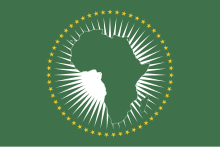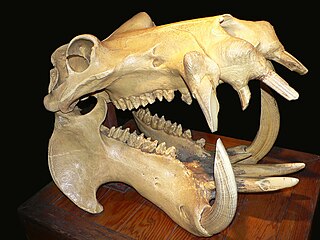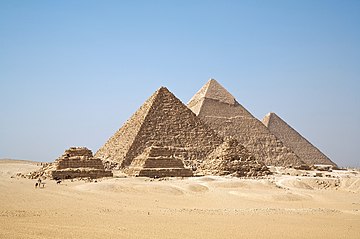Portal:Africa



Africa is the world's second-largest and second-most populous continent after Asia. At about 30.3 million km2 (11.7 million square miles) including adjacent islands, it covers 20% of Earth's land area and 6% of its total surface area. With nearly 1.4 billion people as of 2021, it accounts for about 18% of the world's human population. Africa's population is the youngest among all the continents; the median age in 2012 was 19.7, when the worldwide median age was 30.4. Based on 2024 projections, Africa's population will reach 3.8 billion people by 2099. Africa is the least wealthy inhabited continent per capita and second-least wealthy by total wealth, ahead of Oceania. Scholars have attributed this to different factors including geography, climate, corruption, colonialism, the Cold War, and neocolonialism. Despite this low concentration of wealth, recent economic expansion and a large and young population make Africa an important economic market in the broader global context. Africa has a large quantity of natural resources and food resources, including diamonds, sugar, salt, gold, iron, cobalt, uranium, copper, bauxite, silver, petroleum, natural gas, cocoa beans, and.
Africa straddles the equator and the prime meridian. It is the only continent to stretch from the northern temperate to the southern temperate zones. The majority of the continent and its countries are in the Northern Hemisphere, with a substantial portion and a number of countries in the Southern Hemisphere. Most of the continent lies in the tropics, except for a large part of Western Sahara, Algeria, Libya and Egypt, the northern tip of Mauritania, and the entire territories of Morocco, Ceuta, Melilla, and Tunisia, which in turn are located above the tropic of Cancer, in the northern temperate zone. In the other extreme of the continent, southern Namibia, southern Botswana, great parts of South Africa, the entire territories of Lesotho and Eswatini and the southern tips of Mozambique and Madagascar are located below the tropic of Capricorn, in the southern temperate zone.
Africa is highly biodiverse; it is the continent with the largest number of megafauna species, as it was least affected by the extinction of the Pleistocene megafauna. However, Africa also is heavily affected by a wide range of environmental issues, including desertification, deforestation, water scarcity, and pollution. These entrenched environmental concerns are expected to worsen as climate change impacts Africa. The UN Intergovernmental Panel on Climate Change has identified Africa as the continent most vulnerable to climate change.
The history of Africa is long, complex, and varied, and has often been under-appreciated by the global historical community. In African societies the oral word is revered, and they have generally recorded their history via oral tradition, which has led anthropologists to term them oral civilisations, contrasted with literate civilisations which pride the written word. During the colonial period, oral sources were deprecated by European historians, which gave them the impression Africa had no recorded history. African historiography became organized at the academic level in the mid-20th century, and saw a movement towards utilising oral sources in a multidisciplinary approach, culminating in the General History of Africa, edited by specialists from across the continent. (Full article...)
Selected article –

The African Union (AU) is a continental union of 55 member states located on the continent of Africa. The AU was announced in the Sirte Declaration in Sirte, Libya, on 9 September 1999, calling for the establishment of the African Union. The bloc was launched on 9 July 2002 in Durban, South Africa. The intention of the AU was to replace the Organisation of African Unity (OAU), established on 25 May 1963 in Addis Ababa by 32 signatory governments; the OAU was disbanded on 9 July 2002. The most important decisions of the AU are made by the Assembly of the African Union, a semi-annual meeting of the heads of state and government of its member states.
The AU's secretariat, the African Union Commission, is based in Addis Ababa. The largest city in the AU is Lagos, Nigeria while the largest urban agglomeration is Cairo, Egypt. The African Union has more than 1.3 billion people and an area of around 30 million km2 (12 million sq mi) and includes world landmarks such as the Sahara and the Nile. The primary working languages are Arabic, English, French, Portuguese, Spanish, and Swahili. Within the African Union, there are official bodies, such as the Peace and Security Council and the Pan-African Parliament. (Full article...)
Featured pictures –
Did you know (auto-generated) -

- ... that Magawa, an African giant pouched rat, sniffed out more than 70 land mines in Cambodia?
- ... that in 2022, Four Hundred Souls: A Community History of African America was a finalist for both an Andrew Carnegie Medal for Excellence in Nonfiction and an Audie Award for Multi-voiced Performance?
- ... that Jérôme Chappellaz wants to collect ice cores from Africa's Mount Kilimanjaro to be preserved in Antarctica?
- ... that 555 Edgecombe Avenue, once named for a British soldier and occupied entirely by white Americans, later attracted notable African Americans like Paul Robeson and Count Basie?
- ... that after erecting the African Union headquarters, the Chinese government was accused in 2018 of spying on the building for five years?
- ... that scientists tested the age of an African termite's inhabited mound—and found it to be 34,000 years old?
Categories
Selected biography –
Pope Miltiades (Greek: Μιλτιάδης, Miltiádēs), also known as Melchiades the African (Μελχιάδης ὁ Ἀφρικανός Melkhiádēs ho Aphrikanós), was the bishop of Rome from 311 to his death on 10 or 11 January 314. It was during his pontificate that Emperor Constantine the Great issued the Edict of Milan (313), giving Christianity legal status within the Roman Empire. The pope also received the palace of Empress Fausta where the Lateran Palace, the papal seat and residence of the papal administration, would be built. At the Lateran Council, during the schism with the Church of Carthage, Miltiades condemned the rebaptism of apostatised bishops and priests, a teaching of Donatus Magnus. (Full article...)
Selected country –
 |
 |
|

| ||
The Democratic Republic of the Congo (French: République démocratique du Congo) is the third largest country by area on the African continent. Though it is located in the Central African UN subregion, the nation is economically and regionally affiliated with southern Africa as a member of the Southern African Development Community (SADC).
Formerly the Belgian colony of the Belgian Congo, the country's post-independence name was the Republic of the Congo until August 1, 1964, when its name was changed to the Democratic Republic of the Congo to distinguish it from the neighboring Republic of the Congo. On October 27, 1971, then-President Mobutu renamed the country Zaire. Following the First Congo War, which led to the overthrow of Mobutu in 1997, the country was renamed Democratic Republic of the Congo. From 1998 to 2003, the country suffered from the devastating Second Congo War (sometimes referred to as Africa's World War), the world's deadliest conflict since World War II. Related fighting still continues in the east of the country. (Read more...)
Selected city –
Eldoret is a city in the Rift Valley region of Kenya. It serves as the capital of Uasin Gishu County. Located in western Kenya, and lying south of the Cherangani Hills, the local elevation varies from about 2,100 metres (6,900 ft) at the airport to more than 2,700 metres (8,900 ft) in nearby areas.
As per the 2019 population census, Eldoret has a population of 475,716 people and is the fifth most populated urban area in the country after Nairobi, Mombasa, Nakuru and Ruiru. (Full article...)
In the news
- 12 February 2024 –
- Two boats collide on the Congo River near Kinshasa, Democratic Republic of the Congo; with the death toll remains unclear. (AP)
- 11 February 2024 – 2023 Africa Cup of Nations
- In association football, hosts Ivory Coast win their third Africa Cup of Nations by defeating Nigeria 2–1 in the final. Sébastien Haller scores the winning goal in the 81st minute. (The Guardian)
- 10 February 2024 – Somali civil war
- Four Emirati soldiers and a Bahraini military officer are killed, while ten other people are injured, when a soldier opens fire at a military base in Mogadishu, Somalia, before being killed in the ensuing shootout. Al-Shabaab claims responsibility. (AP)
- 10 February 2024 –
- A Eurocopter EC130 helicopter crashes near Nipton, California, United States, killing all the six people on board, including Nigerian banker Herbert Wigwe. (CBS News)
- 10 February 2024 – 2023–2024 Senegalese protests
- Violent protests occur in Senegal following an announcement by President Macky Sall that presidential elections have been delayed from February 25 to December 15. (Sky News)
- 9 February 2024 –
- At least 18 people are killed during a collision between a bus and a truck on a road in Kinshasa, Democratic Republic of the Congo. (AP)
Updated: 16:33, 14 February 2024
General images -
Africa topics
More did you know –
- ...that members of the Senegalese rap group Daara J were hired by campaigners in the Senegalese election of 2000 to edit their speeches?
- ...that Senegalese hip hop group Positive Black Soul's name abbreviation, PBS, is a play on that of the Parti Démocratique Sénégalais, PDS?
- ...that Mamadou Diabaté, a Malian kora player, was nominated for a Grammy Award in 2005, but lost to his cousin Toumani Diabaté?
- ...that, in November 2007, The Sowetan published an article which erroneously claimed that South African political activist Dan Mokonyane had died?
Related portals
Major Religions in Africa
North Africa
West Africa
Central Africa
East Africa
Southern Africa
Associated Wikimedia
The following Wikimedia Foundation sister projects provide more on this subject:
-
Commons
Free media repository -
Wikibooks
Free textbooks and manuals -
Wikidata
Free knowledge base -
Wikinews
Free-content news -
Wikiquote
Collection of quotations -
Wikisource
Free-content library -
Wikispecies
Directory of species -
Wikiversity
Free learning tools -
Wikivoyage
Free travel guide -
Wiktionary
Dictionary and thesaurus























































































